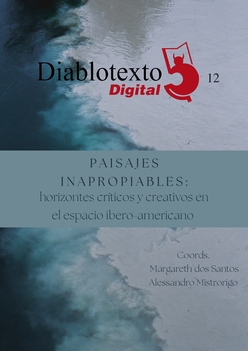Distance and roots. The appropriation of urban spaces narrated in El Faro of Felipe González
DOI:
https://doi.org/10.7203/diablotexto.12.25190Keywords:
Distancing, spatial appropriation, roots, city, Chilean novel Abstract
Abstract
In view of the few critical studies about the concept of literary appropriation of urban spaces, this article aims to cover this theorical gap by applying this notion in the analysis of El Faro. One of the dimensions of literary appropriation is distancing, an operation that configures spatial representations of the novel in three ways: in the narrator’s focus; in the reflections about the scriptural exercise; in memory work. The conclusions indicate that the distance gaze is constituted as a way of putting down roots in the spaces and as a creative instance of new imaginaries about the city.
 Downloads
Downloads
 References
References
AGAMBEN, Giorgio. [2014] (2017). El uso de los cuerpos. Traducción de Rodrigo Molina-Zavalía. Buenos Aires: Adriana Hidalgo.
ANÓNIMO (2020). “Felipe González: Hay una tendencia a la lectura literal, a los discursos nítidos y correctos” en http://loqueleimos.com/2020/11/felipe-gonzalez-hay-una-tendencia-a-la -lectura-literal-a-los-discursos-nitidos-y-correctos/ [Fecha de consulta: 10 de noviembre de 2021]
BRAIDOTTI, Rosi. [2006] (2009). Transposiciones. Sobre la ética nómada. Traducción de Alcira Bixio. Barcelona: Gedisa.
BRECHT, Bertolt. [1933-1947] (2004). Escritos sobre teatro. Traducción de Genoveva Dieterich. Barcelona: Editorial Alba.
DE CERTEAU, Michel. [1980] (2000). La invención de lo cotidiano I. Artes de hacer. Traducción de de Alejandro Pescador. Ciudad de México: Universidad Iberoamericana.
ECO, Umberto. [1994] (1996). Seis paseos por los bosques narrativos. Traducción de Helena Lozano Miralles. Barcelona: Lumen.
ESPINOZA, Patricia (2020). “El cultivo de la memoria”. Las Ultimas Noticias, 25/09/2020, p. 38.
GONZÁLEZ, Felipe. (2020). El Faro. Santiago de Chile: La Pollera.
GUERRERO VALENZUELA, Claudio (2020). “Abrazar espectros”, en https://revistaelipsis.org/2020/09/14/el-faro-una-critica-de-claudio-guerrero-valenzuela/ [Fecha de consulta: 10 de julio de 2022]
FAJARDO, Marco (2020). “Felipe González en Cita de libros, y su novela sobre un desaparecido en democracia: ‘si no perteneces a una clase acomodada, la justicia es indiferente’”. Cita de libros. Podcast, https://podcastaddict.com/episode/113308036 [Fecha de consulta: 2 de octubre de 2020].
FOUCAULT, Michel. [1966] (2020). Utopie. Eterotopie. Napoli: Cronopio.
OCIATKIEWICZ, Jerzy y KOSTERA, Monika (1999). “The Anthropology of Empty Spaces”, Qualitative Sociology (enero 1999), 22, 1, 37-50 pp.
TURCO, Angelo (1988). Verso una teoria geografica della complessità. Milano: Unicopli.
WESTPHAL, Bertrand (2009). Geocritica. Reale Finzione Spazio. Traducción de Lorenzo Flabbi. Roma: Armando Editore.
Downloads
Published
How to Cite
-
Abstract256
-
PDF (Español)155
Issue
Section
License
Licencia de reconocimiento de Creative Commons “Reconocimiento - No Comercia l- Sin Obra Derivada
Authors who publish with this journal agree to the following items:
The authors will keep their copyright and guarantee the journal the right of first publication of their work, which will be simultaneously subject to the Creative Commons license that allows third parties to share the work indicating its author and its first publication in the journal. The authors may adopt other non-exclusive license agreements to distribute the version of the published work (e.g., depositing it in an institutional telematic file or publishing it in a monographic volume), with an acknowledgment of its initial publication in this journal. The authors are allowed and encouraged to disseminate their work through the Internet (e.g., in institutional telematic archives or on their website) before and during the submission process, which can produce interesting exchanges and increase citations of the published work. (See Effect of Open Access)




